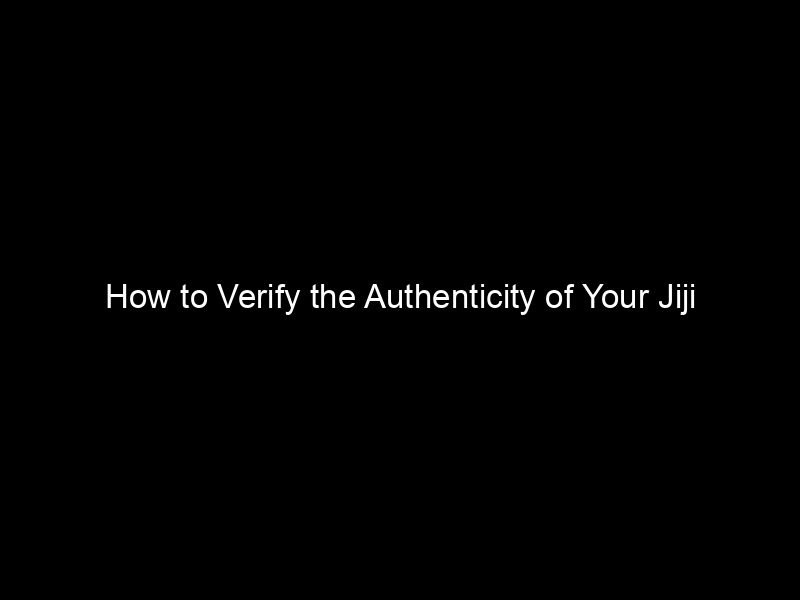In the dynamic landscape of Nigeria’s e-commerce sector, platforms like Jiji have revolutionized the way we engage in online buying and selling. Jiji, a popular online marketplace, has become a household name, offering a vast array of products and services. However, with the rise of digital platforms comes the inevitable challenge of ensuring transactional security and verifying seller authenticity. As an individual with extensive experience in Nigeria’s e-commerce business, I understand the importance of navigating these platforms safely. This comprehensive guide aims to provide you with practical insights on how to determine if a seller on Jiji is real, safeguarding your online shopping experience.
Detailed Insights into Seller Verification on Jiji
The Importance of Verifying Seller Authenticity
The primary concern for any buyer is the authenticity of the seller. Engaging with a genuine seller not only guarantees the quality of the product but also ensures that your financial and personal information remains secure. In the context of Jiji, where numerous independent sellers converge, it becomes crucial to identify legitimate sellers to prevent fraud and scams.
Steps to Verify a Jiji Seller
- Check the Seller’s Profile: Start by examining the seller’s profile on Jiji. Look for the length of time they have been active on the platform, the number of products listed, and customer reviews. A well-established profile with a history of positive reviews is a good indicator of a legitimate seller.
- Communication is Key: Engage with the seller through Jiji’s messaging platform. Genuine sellers are typically responsive and provide clear, detailed information about their products. Be cautious of sellers who are vague or push for off-platform communication.
- Verify Contact Information: Legitimate sellers usually provide valid contact details. Cross-check these details through online searches or social media platforms to ascertain their authenticity.
- Ask for Proof of Product: Request real-time photos or videos of the product. This not only confirms the product’s existence but also gives you a chance to assess its condition.
- Look for Payment Security: A genuine seller will often use secure and traceable payment methods. Be wary of sellers who insist on untraceable payment options.
- Meet in Public Places for Physical Inspection: If possible, arrange a meeting in a public place to inspect the product physically. This step is crucial for high-value items.
Common Red Flags
- Sellers who avoid direct answers or provide inconsistent information.
- Unusually low prices that seem too good to be true.
- Pressure to complete the transaction quickly or outside the Jiji platform.
- Refusal to provide additional photos or videos of the product.
Related FAQs
Q: What should I do if I encounter a suspicious seller on Jiji?
A: Report the seller to Jiji’s customer service and avoid any further interaction. Jiji has mechanisms in place to investigate and take appropriate action against fraudulent sellers.
Q: Is it safe to pay for products before receiving them?
A: It’s advisable to use payment methods that offer buyer protection. Alternatively, opt for cash on delivery (COD) where possible, especially with new sellers.
Q: How reliable are customer reviews on Jiji?
A: While customer reviews can be a good indicator of a seller’s reliability, they should not be the sole factor in your decision-making. Cross-reference reviews with other verification steps.
Q: Can I trust sellers with a ‘Verified’ badge on Jiji?
A: The ‘Verified’ badge indicates that Jiji has conducted some level of verification. However, it’s still important to conduct your due diligence.
Q: What are the best practices for staying safe on Jiji?
A: Always communicate through the platform, meet in public places for physical inspections, use secure payment methods, and trust your instincts. If a deal feels suspicious, it’s better to walk away.
Conclusion
Navigating Nigeria’s e-commerce platforms like Jiji requires a blend of vigilance, knowledge, and caution. By following the steps outlined above and remaining aware of common red flags, you can significantly reduce the risk of encountering fraudulent sellers. Remember, a safe transaction is not just about finding the right product but also engaging with a real, trustworthy seller. Stay informed, stay safe, and happy shopping on Jiji!
